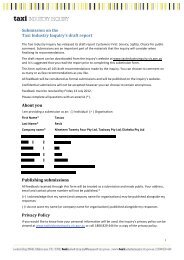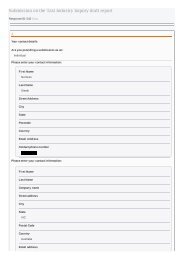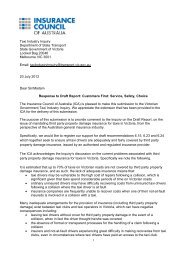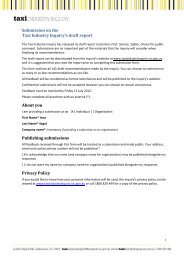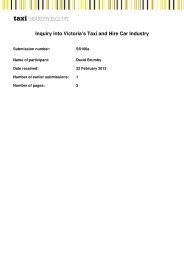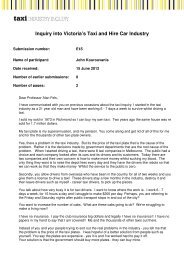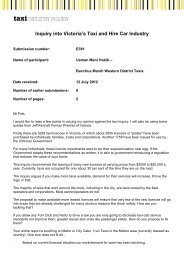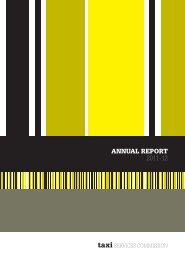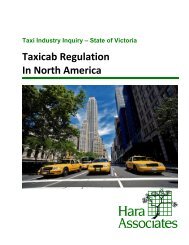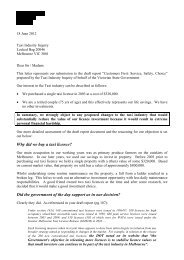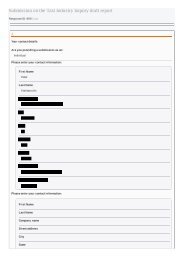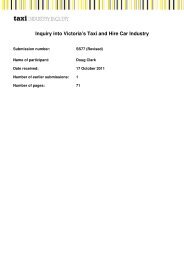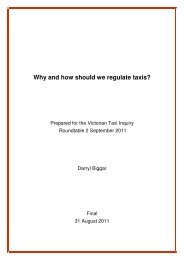Part D â Understanding and improving industry performance (PDF ...
Part D â Understanding and improving industry performance (PDF ...
Part D â Understanding and improving industry performance (PDF ...
You also want an ePaper? Increase the reach of your titles
YUMPU automatically turns print PDFs into web optimized ePapers that Google loves.
Avalon Airport<br />
The service of Avalon Airport highlights further <strong>performance</strong><br />
problems that can result from zoning restrictions.<br />
Avalon Airport is 65 kilometres from Melbourne <strong>and</strong><br />
19 kilometres from Geelong. It currently sits in the<br />
Geelong taxi zone. This means that only Geelongzoned<br />
taxis are able to use the Avalon Airport<br />
rank <strong>and</strong> accept fares. Melbourne-zoned taxis<br />
can only drop off passengers at Avalon Airport or<br />
arrange for a pre-booked pick-up at the airport.<br />
The <strong>performance</strong> issue is that many (<strong>and</strong> perhaps<br />
most) passengers using Avalon Airport are bound for<br />
Melbourne. This implies that having Avalon Airport in the<br />
Geelong zone is particularly costly – because Geelong<br />
taxis must ‘dead run’ back to the Geelong zone after a<br />
Melbourne drop-off (again, unless a pre-booked fare can<br />
be found in Melbourne going to Geelong) <strong>and</strong> Melbourne<br />
taxis must ‘dead run’ back to the Melbourne zone.<br />
Geelong Taxi Network put to the inquiry that<br />
the issue is not, in essence, a zoning issue, but<br />
related to the expensive fare between Avalon <strong>and</strong><br />
Melbourne (over $100). It argues that changes to<br />
the fare <strong>and</strong> the zone will disadvantage Geelongbased<br />
drivers. This view is not surprising <strong>and</strong><br />
reflects the interests created by zoning restrictions<br />
in combination with high fares for long journeys.<br />
It would be far more efficient – <strong>and</strong> no more costly for<br />
consumers – if both Geelong <strong>and</strong> Melbourne taxis could<br />
pick-up <strong>and</strong> drop-off at Avalon Airport. This may require<br />
some re-organisation of ranks at the airport so that<br />
Geelong taxis take fares to Geelong <strong>and</strong> Melbourne taxis<br />
take fares to Melbourne.<br />
Zoning licence conditions restrict competition<br />
between networks<br />
Detailed scrutiny of the conditions imposed on licences by<br />
the regulator raises still more concerns about the zoning<br />
provisions. In particular, it seems clear that the provisions<br />
not only restrict competition between operators directly,<br />
but also restrict competition between NSPs.<br />
The general practice of the regulator has been to only<br />
approve depots 97 that are physically located in the<br />
metropolitan zone. The operator of any new licence<br />
then has to gain access to one of the approved depots<br />
in the zone, thus preventing depots outside the zone<br />
from becoming active competitors of the depots in the<br />
zone. This is made quite explicit in the licence conditions<br />
relating to the outer suburban <strong>and</strong> urban zones: for<br />
example, the outer suburban licence conditions require<br />
that the licensed vehicle ‘must at all times be operated<br />
under radio control from a depot approved by the VTD<br />
that is located within the outer suburban taxi-cab zone’<br />
(emphasis added). 98<br />
In smaller markets, where there is really room for only<br />
one depot to operate efficiently given the existence of<br />
economies of scale in the communications function, this<br />
rule effectively means that local depots have a monopoly<br />
over the provision of booking services in their zones.<br />
Competition between depots might be stimulated if<br />
operators had a choice of depot <strong>and</strong> were not restricted<br />
to acquiring services only from depots within their zone.<br />
In other country zones, the requirement to operate under<br />
the radio control of a depot within the relevant zone does<br />
not exist, presumably because many of these locations<br />
are just too small to have their own depots. Hence the<br />
licence condition only requires that the licensed vehicle<br />
‘must at all times be operated under radio control from<br />
an approved depot’. 99<br />
Inquiry findings<br />
è Current taxi zoning policies are causing a<br />
number of issues in Victoria. They are inflexible<br />
<strong>and</strong> are causing costs for taxi operators <strong>and</strong><br />
consumers where the zone boundaries are no<br />
longer appropriate given population growth or<br />
other developments.<br />
è Taxi zones are intimately linked to entry<br />
restrictions <strong>and</strong> the value of taxi licences.<br />
Reform will require attention to both policies.<br />
Metropolitan zone taxis for conventional perpetual <strong>and</strong><br />
peak licences ‘must at all times be operated under radio<br />
control from a depot approved by the VTD for the receipt<br />
<strong>and</strong> dispatch of bookings for taxis licensed to operate in<br />
the metropolitan taxi-cab zone <strong>and</strong> must be fitted with<br />
fully operational Global Positioning System equipment<br />
linked to that depot’. 96<br />
96 Based on information provided to the Taxi Industry Inquiry by the VTD<br />
97 This process is now referred to as the accreditation of network<br />
service providers (see chapter 7)<br />
98 Based on information provided to the Taxi Industry Inquiry by the VTD<br />
99 Based on information provided to the Taxi Industry Inquiry by the VTD<br />
212



